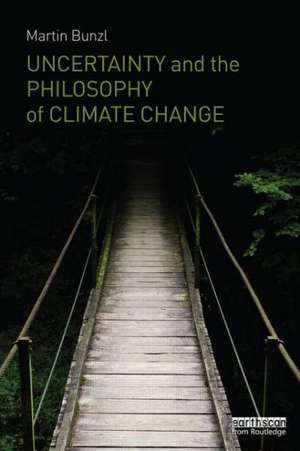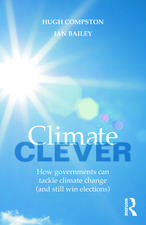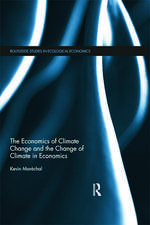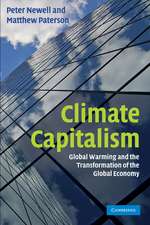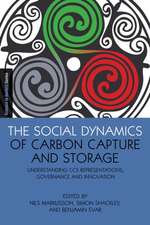Uncertainty and the Philosophy of Climate Change
Autor Martin Bunzlen Limba Engleză Paperback – 9 oct 2014
Drawing on both the philosophy of science and ethics, Martin Bunzl shows how tackling climate change revolves around weighing up our interests now against those of future generations, which requires that we examine our assumptions about the value of present costs versus future benefits. In an engaging, conversational style, Bunzl looks at questions such as our responsibility towards non-human life, the interests of the developing and developed worlds, and how the circumstances of poverty shape the perception of risk, ultimate developing and defending a view of humanity and its place in the world that makes sense of our duty to Nature without treating it as a rights bearer.
This book will be of interest to students and scholars of environmental studies, philosophy, politics and sociology as well as policy makers.
| Toate formatele și edițiile | Preț | Express |
|---|---|---|
| Paperback (1) | 472.80 lei 43-57 zile | |
| Taylor & Francis – 9 oct 2014 | 472.80 lei 43-57 zile | |
| Hardback (1) | 978.46 lei 43-57 zile | |
| Taylor & Francis – 9 oct 2014 | 978.46 lei 43-57 zile |
Preț: 472.80 lei
Nou
Puncte Express: 709
Preț estimativ în valută:
90.48€ • 93.99$ • 75.16£
90.48€ • 93.99$ • 75.16£
Carte tipărită la comandă
Livrare economică 03-17 februarie 25
Preluare comenzi: 021 569.72.76
Specificații
ISBN-13: 9781138793927
ISBN-10: 1138793922
Pagini: 196
Ilustrații: 14 black & white illustrations, 20 black & white tables, 14 black & white line drawings
Dimensiuni: 156 x 234 x 13 mm
Greutate: 0.29 kg
Ediția:1
Editura: Taylor & Francis
Colecția Routledge
Locul publicării:Oxford, United Kingdom
ISBN-10: 1138793922
Pagini: 196
Ilustrații: 14 black & white illustrations, 20 black & white tables, 14 black & white line drawings
Dimensiuni: 156 x 234 x 13 mm
Greutate: 0.29 kg
Ediția:1
Editura: Taylor & Francis
Colecția Routledge
Locul publicării:Oxford, United Kingdom
Public țintă
PostgraduateCuprins
Preface 1. Risk and the Perception of Risk 2. The Cost of Extinction 3. The Rights of Those Who Will Not Be 4. The Three Tropes of Climate Change 5. The View from the Inside of Poverty 6. Social Policy and Rational Action 7. The Tragedy of the Commons Revisited 8. Negotiations Gone Bad 9. Going it alone 10. What if it is too late? 11. Fusion Bibliography
Recenzii
Martin Bunzl brings philosophy out of the ivory tower and into our everyday lives. What responsibility do I have to my future self, 20 years from now? What responsibility do we, as a society, have to future generations and the natural environment? Bunzl compellingly makes the case that an understanding of philosophic issues is central to successfully addressing the most important question of our lives: How to live well in a world where our actions can inflict (or at least not alleviate) hardship and suffering on others?
Ken Caldeira, Carnegie Institution for Science, USA
Martin Bunzl takes the idea of climate change as a risk management problem seriously. In a book that is personal, as well as philosophically, politically, and scientifically well-informed, he asks us to see the challenge of climate change in collective terms. Our future is dark, according to the author, unless we can overcome our individualism and parochial concerns.
Dale Jamieson, New York University, USA
Ken Caldeira, Carnegie Institution for Science, USA
Martin Bunzl takes the idea of climate change as a risk management problem seriously. In a book that is personal, as well as philosophically, politically, and scientifically well-informed, he asks us to see the challenge of climate change in collective terms. Our future is dark, according to the author, unless we can overcome our individualism and parochial concerns.
Dale Jamieson, New York University, USA
Descriere
In demonstrating the moral imperative to act on climate change, the book’s ethical analysis is not an end in itself, but a means to clarifying policy. Drawing on the philosophy of science, the book examines our obligations to future generations and how we ought to make decisions when there is catastrophic risk but its probability is unknown.
